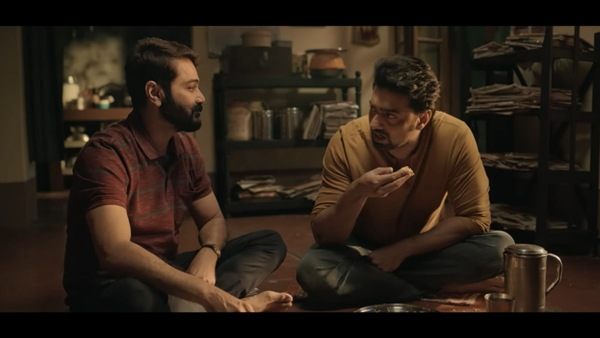Kacher Manush review: Prosenjit, Dev pay tribute to Rajen Tarafdar’s Jiban Kahini
Pathikrit Basu’s drama cheers life.

Last Updated: 10.10 PM, Sep 30, 2022
Story: After Kuntal’s (Dev) brother dies by suicide, his mother (Tulika Basu) suffers a stroke and loses mobility. He has no job and is drowned in debt. When he decides to end his life, a random passerby, Sudhangshu (Prosenjit), saves him. He hatches a dangerous plan for him so that both get some money.
Review: Kacher Manush tries to build a social picture in which common people struggle to get hold of some money. So much is desperation that they consider extreme options in life. The two characters here are these common men in desperate need of money. While Kuntal’s mother is ill, Sudhangshu’s sister suffers from a heart condition. None of these two have money for the treatment. Neither do they have employment. They owe money to people and get humiliated every day. Will ending life solve their problem?
The film is a tribute to Rajen Tarafdar’s Jiban Kahini. The plot is more or less the same but the new one has contemporised the events – chit fund scam, digitisation of money, the meeting of hero and heroine, and so on. However, both the films hail the spirit of life in the end and that is the message that this film aims to convey. The end scroll emphasised the social commitment of the film.
The film falters on a couple of occasions. First, the film is too long. In the last-minute drama, confusion over who is dying looks very shallow. Ranjit Mallick’s entry as the divine intervention has no cinematic credibility and that dilutes the realistic flow of the film.
Second, Jiban Kahini encapsulates a social dilemma. The pressure of broken economic conditions in post-independent India, degrading social values, and similar aspects are missing Pathikrit’s venture. Instead, Kacher Manush becomes a saga of individuals rather than a tale of collective struggle. Hence, it lacks relatability.
One of the best bits of the film is the performance of the three main characters. Prosenjit is outstanding. The way he blends humour with his pain and delivers a snappy dialogue reestablishes his acting calibre. Deb looks fabulous on screen, so much so that you cannot take your eyes off his shy and melancholy journey. His diction is widely talked about and no point in going there but he overcomes that with his expression and performance. The charm that he carries reflects all over the screen.
Ishaa, as Aalo, is spontaneous and bubbly. She takes no time in drawing the audience into her character. One knows that her character talks a lot and cannot hide her feelings in just two minutes of her presence. The love story between Aalo and Kuntal is heartwarming. Meanwhile, Susmita Chatterjee is underutilised and hence, not convincing enough.
The storyline is known and it doesn’t deviate much. There are no unnecessary clusters of subplots. In fact, Kuntal’s family crisis is really moving. The music is attractive and two songs, Usha Uthup’s Chumbak Mon and Pranjal Biswas’ Taka Lage are exceptionally catchy. Nilayan Chatterjee has done a good job there.
Verdict: Overall, Kacher Manush starts with a promising premise. However, the complicated drama sans any reflection of a relatable social narrative dilutes the possibility of a wholesome film.

 Premium
Premium